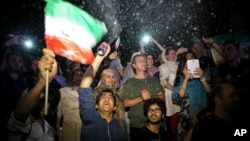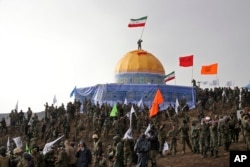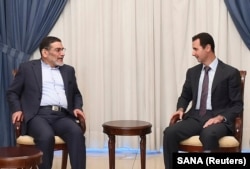U.S. officials are likely correct in their assessment that more of Iran’s sanctions relief money will go toward domestic concerns than to the war in Syria or funding global terrorism, analysts say.
Iran is facing so many pressing economic concerns — along with an upcoming critical parliamentary election — that its attention will be not be intensely focused on foreign affairs, they say.
The terms of a nuclear deal with global powers mean Iran will soon have access to as much as $55 billion of its $100 billion in frozen international assets.
"The Iranian government understands that it needs to spend considerable sums at home to increase its support among the Iranian people, so I doubt that all these unfrozen assets are going to wind up in Syria," said Barbara Slavin, acting director of the Future of Iran Initiative at the Atlantic Council and a longtime Tehran watcher.
Speaking this week at the World Economic Forum in Davos, Switzerland, U.S. Secretary of State John Kerry said he also doubted a substantial part of the unfrozen assets would go to Iran’s Revolutionary Guard Corps, or IRGC. The hard-line military force is reportedly fighting in Syria in support of the Syrian government, along with Russia’s military and Lebanon’s Hezbollah, an Iranian proxy.
"There’s no way they can succeed in doing what they want to do if they’re very busy funding a lot of terrorism," Kerry said of Iran’s leadership and its pressing internal needs.
Still, Kerry acknowledged in an interview with CNBC: "I think that some of it will end up in the hands of the [IRGC] or of other entities, some of which are labeled terrorists to some degree. I’m not going to sit here and tell you that every component of that can be prevented."
More IRGC casualties
Analysts say the number of IRGC and Hezbollah fighters in Syria grew substantially last year and casualties among them have mounted. The Iranian-backed forces are de facto ground troops for the Syrian government, especially in fighting rebel groups in suburbs around Damascus and, in a few cases, Islamic State fighters elsewhere in Syria.
Tehran reportedly increased the number of IRGC personnel in Syria in the final months of 2015, sending as many as 3,500 militia fighters to the front lines to defend Zeinab Shrine, a holy site for Shi’ite Muslims located in the southern suburbs of Damascus.
In a recent interview with Iran’s state-run IRIB TV2 channel, the IRGC’s deputy commander, Brigadier General Hossein Salami, said that the number of Iranian casualties in Syria had increased as a result of an escalation in fighting with rebel forces. Among those killed were several high-ranking generals and a former bodyguard of former President Mahmoud Ahmadinejad, according to Iranian media reports.
Ali Alfoneh, a senior fellow at the Foundation for Defense of Democracies in Washington, said the IRGC has suffered 268 combat fatalities in Syria since January 2012. He said 143 of those deaths occurred after the start of the Russian air campaign in Syria last September.
"This is a clear trend showing an increase in ground level goings-on," Alfoneh said.
War coverage allowed
Iran appears to be allowing the domestic media to cover the troop deaths in Syria.
Afsaran.ir, an official social media outlet, covers the war in Syria by posting the names and photos of the casualties, under the banner "Martyrs in the defense of the Zeinab Shrine." In recent months, it has been touting the presence of Revolutionary Guard members and lauding their accomplishments.
Previously, Iranian media were banned from Syria coverage.
"It seems that the strategy has been changed and now we are not receiving any [orders] in that regard," said an Iranian journalist inside Iran, speaking to VOA on condition of anonymity.
Some analysts say the Revolutionary Guard Corps, which has largely shunned diplomacy with the West, now wants to show the world its prowess in Syria.
"The IRGC has tied its legitimacy to the conflicts and turbulences, so the victory of diplomacy threatens their being," said Alex Vatanka, a senior fellow at the Middle East Institute.
Still, Iran’s foreign minister said this past week that it favors a diplomatic solution — one that would let Syrians decide whether President Bashar al-Assad should remain in power.
But analysts say if Assad ally Russia is willing broker a deal for a change in leadership, Tehran will have to follow.
"Iran is likely concerned about growing pressure for Assad to eventually step aside as part of any cease-fire or settlement," said Matthew McInnis, a resident fellow at the American Enterprise Institute in Washington.
"If the Russians are pressing the Iranians to be more flexible on Assad, Tehran may also be accelerating alternative plans to ensure influence over whatever leadership emerges in Damascus," he said.
'Easier' decisions on Syria
Meanwhile, Iran will continue to support Assad with troops and advice, and analysts say it’s likely some of the newly released frozen assets will help.
"The Islamic Republic's access to its frozen assets abroad certainly makes the decision-making in Tehran easier rather than more difficult," Alfoneh said, referring to Syria.
According to Said Nuri Brimo, a leader of the Kurdistan Democratic Party in Syria, Iran is relieved that sanctions will soon be lifted.
"That gives the mullahs a greater access to more resources to carry on their involvement in Syria," he said. "Tehran won’t abandon Assad at any cost and nothing will change Tehran’s attitude towards Syria."
But analyst McInnis said Tehran’s deeper involvement in Syria will depend more on how Syria’s civil war plays out than how much money it has.
"Sanctions removal will allow for greater access to resources for the IRGC, but that will not be the determining factor for whether the IRGC will become even more active in Syria," he said. "Rather, progress on the battlefield will determine Iran's decisions. Additional resources will, though, allow for greater sustainment of IRGC activities."






